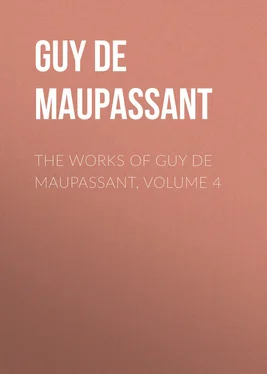Guy Maupassant - The Works of Guy de Maupassant, Volume 4
Здесь есть возможность читать онлайн «Guy Maupassant - The Works of Guy de Maupassant, Volume 4» — ознакомительный отрывок электронной книги совершенно бесплатно, а после прочтения отрывка купить полную версию. В некоторых случаях можно слушать аудио, скачать через торрент в формате fb2 и присутствует краткое содержание. Жанр: literature_19, foreign_antique, foreign_prose, на английском языке. Описание произведения, (предисловие) а так же отзывы посетителей доступны на портале библиотеки ЛибКат.
- Название:The Works of Guy de Maupassant, Volume 4
- Автор:
- Жанр:
- Год:неизвестен
- ISBN:нет данных
- Рейтинг книги:5 / 5. Голосов: 1
-
Избранное:Добавить в избранное
- Отзывы:
-
Ваша оценка:
- 100
- 1
- 2
- 3
- 4
- 5
The Works of Guy de Maupassant, Volume 4: краткое содержание, описание и аннотация
Предлагаем к чтению аннотацию, описание, краткое содержание или предисловие (зависит от того, что написал сам автор книги «The Works of Guy de Maupassant, Volume 4»). Если вы не нашли необходимую информацию о книге — напишите в комментариях, мы постараемся отыскать её.
The Works of Guy de Maupassant, Volume 4 — читать онлайн ознакомительный отрывок
Ниже представлен текст книги, разбитый по страницам. Система сохранения места последней прочитанной страницы, позволяет с удобством читать онлайн бесплатно книгу «The Works of Guy de Maupassant, Volume 4», без необходимости каждый раз заново искать на чём Вы остановились. Поставьте закладку, и сможете в любой момент перейти на страницу, на которой закончили чтение.
Интервал:
Закладка:
So discreet, that he reassured even the most timid, and certainly not given to melancholy, he understood extremely well how to vary his kisses and his ways of proceeding; how to work on women's feelings, and to overcome their scruples, to obtain a hold over them through their curiosity to learn something new, by the temptation of a comfortable, well-furnished, warm room, that was fragrant with flowers, and where a little supper was already served as a prologue to the entertainment. His female pupils would certainly have deserved the first prize in a love competition.
So men mistrusted that ancient Lovelace as if he had been the plague, when they had plucked some rare and delicious fruit, and had sketched out some charming adventure, for he always managed to discover the weak spot, and to penetrate into the place.
To some, he held out the lure of debauch without any danger attached to it, the desire of finishing their amorous education, of reveling in perverted enjoyment, and to others he held out the irresistible argument that seduced Danae, that of gold.
Others, again, were attracted by his cocked hat and feathers, and by the conceited hope of seeing him at their knees, of throwing their arms round him as if he had been an ordinary lover, although he was a general who rode so imposingly, who was covered with decorations, and to whom all the regiments presented arms simultaneously, the chief whose orders could not be commented on or disputed, and who had such a martial and haughty look.
His pay, allowances and his private income of fifteen thousand francs, 2 2 £600.
all went in this way, like water that runs out drop by drop, from a cracked bottle.
He was continually on the alert, and looked out for intrigues with the acuteness of a policeman, followed women about, had all the impudence and all the cleverness of the fast man who has made love for forty years, without ever meaning anything serious, who knows all its lies, tricks and illusions, and who can still do a march without halting on the road, or requiring too much music to put him in proper trim. And in spite of his age and gray hairs, he could have given a sub-lieutenant points, and was very often loved for himself, which is the dream of men who have passed forty, and do not intend to give up the game just yet.
And there were not a dozen in the town who could, without lying, have declared to a jealous husband or a suspicious lover, that they had not, at any rate, once staid late in the little house in the Eglisottes quarter, who could have denied that they had not returned more thoughtful. Not a dozen, certainly, and, perhaps, not six!
Among that dozen or six, however, was Jacques de Montboron's mistress. She was a little marvel, that Madame Courtade, whom the Captain had unearthed in an ecclesiastical warehouse in the Faubourg Saint-Exupère, and not yet twenty. They had begun by smiling at each other, and by exchanging those long looks when they met, which seemed to ask for charity.
Montboron used to pass in front of the shop at the same hours, stopped for a moment with the appearance of a lounger who was loitering about the streets, but immediately her supple figure appeared, pink and fair, shedding the brightness of youth and almost childhood round her, while her looks showed that she was delighted at little gallant incidents which dispelled the monotony and weariness of her life for a time, and gave rise to vague but delightful hopes.
Was love, that love which she had so constantly invoked, really knocking at her door at last, and taking pity on her unhappy isolation? Did that officer, whom she met whenever she went out, as if he had been faithfully watching her, when coming out of church, or when out for a walk in the evening, who said so many delightful things to her with his wheedling eyes, really love her as she wished to be loved, or was he merely amusing himself at that game, because he had nothing better to do in their quiet little town?
But in a short time he wrote to her, and she replied to him, and at last they managed to meet in secret, to make appointments, and talk together.
She knew all the cunning tricks of a simple girl, who has tasted the most delicious of sweets with the tip of her tongue, and acting in concert, and giving each other the word, so that there might be no awkward mistake, they managed to make the husband their unwitting accomplice, without his having the least idea of what was going on.
Courtade was an excellent fellow, who saw no further than the tip of his nose, incapable of rebelling, flabby, fat, steeped in devotion, and thinking too much about heaven to see what a plot was being hatched against him, in our unhappy vale of tears, as the psalters say.
In the good old days of confederacies, he would have made an excellent chief of a corporation; he loved his wife more like a father than a husband, considering that at his age a man ought no longer to think of such trifles, and that, after all, the only real happiness in life was to keep a good table and to have a good digestion, and so he ate like four canons, and drank in proportion.
Only once during his whole life had he shown anything like energy – but he used to relate that occurrence with all the pride of a conqueror, recalling his most heroic battle – and that was on the evening when he refused to allow the bishop to take his cook away, quite regardless of any of the consequences of such a daring deed.
In a few weeks, the Captain became his regular table companion, and his best friend. He had begun by telling him in a boastful manner that, in order to keep a vow that he had made to St. George, during the charge up the slope at Yron, during the battle of Gravelotte, he wished to send two censers and a sanctuary lamp to his village church.
Courtade did his utmost, and all the more readily as this unexpected customer did not appear to pay any regard to money. He sent for several goldsmiths, and showed Montboron models of all kinds; he hesitated, however, and did not seem able to make up his mind, and discussed the subject, designed ornaments himself, gained time, and thus managed to spend several hours every day in the shop.
In fact, he was quite at home in the place, shook hands with Courtade, called him "my dear fellow," and did not wince when he took his arm familiarly before other people, and introduced him to his customers as, "My excellent friend, the Marquis de Montboron." He could go in and out of the house as he pleased, whether the husband was at home or not.
The censers and the lamp were sent in due course to Montboron's château at Pacy-sur-Romanche (in Normandy), and when the package was undone, it caused the greatest surprise to Jacques' mother, who was more accustomed to receiving requests for money from her son, than ecclesiastical objects.
Suddenly, however, without rhyme or reason, little Madame Courtade became insupportable and enigmatical. Her husband could not understand it at all, and grew uneasy, and continually consulted his friend the Captain.
Etiennette's character seemed to have completely changed; she found fifty pretexts for deserting the shop, for coming late, for avoiding tête-à-têtes , in which people come to explanations, and mutually become irritated, though such matters usually end in a reconciliation, amidst a torrent of kisses.
She disappeared for days at a time, and soon, Montboron, who was not fitted to play the part of a Sganarelle, either by age or temperament, became convinced that his mistress was making him wear the horns, that she was hobnobbing with the General, and that she was in possession of one of the five keys of the house in the Eglisottes quarter; and as he was as jealous as an Andalusian, and felt a horror for that kind of pleasantry, he swore that he would make his rival pay a hundred fold for the trick which he had played him.
Читать дальшеИнтервал:
Закладка:
Похожие книги на «The Works of Guy de Maupassant, Volume 4»
Представляем Вашему вниманию похожие книги на «The Works of Guy de Maupassant, Volume 4» списком для выбора. Мы отобрали схожую по названию и смыслу литературу в надежде предоставить читателям больше вариантов отыскать новые, интересные, ещё непрочитанные произведения.
Обсуждение, отзывы о книге «The Works of Guy de Maupassant, Volume 4» и просто собственные мнения читателей. Оставьте ваши комментарии, напишите, что Вы думаете о произведении, его смысле или главных героях. Укажите что конкретно понравилось, а что нет, и почему Вы так считаете.












